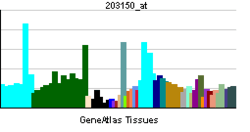RABEPK
| RABEPK | ||||||
|---|---|---|---|---|---|---|
| Identifiers | ||||||
| Aliases | RABEPK, RAB9P40, bA65N13.1, p40, Rab9 effector protein with kelch motifs | |||||
| External IDs | MGI: 2139530 HomoloGene: 48772 GeneCards: RABEPK | |||||
| RNA expression pattern | ||||||
 | ||||||
| More reference expression data | ||||||
| Orthologs | ||||||
| Species | Human | Mouse | ||||
| Entrez | ||||||
| Ensembl | ||||||
| UniProt | ||||||
| RefSeq (mRNA) | ||||||
| RefSeq (protein) | ||||||
| Location (UCSC) | Chr 9: 125.2 – 125.23 Mb | Chr 2: 34.78 – 34.8 Mb | ||||
| PubMed search | [1] | [2] | ||||
| Wikidata | ||||||
| View/Edit Human | View/Edit Mouse |
Rab9 effector protein with Kelch motifs also known as p40 is a protein that in humans is encoded by the RABEPK gene.[3][4]
Membrane-associated p40, in together with RAB9A, facilitates the transport of the mannose 6-phosphate receptor (MPR) from endosomes to the trans-Golgi network.[3]
Interactions
RABEPK has been shown to interact with RAB9A[3] and FYVE finger-containing phosphoinositide kinase.[5]
References
- ↑ "Human PubMed Reference:".
- ↑ "Mouse PubMed Reference:".
- 1 2 3 Diaz E, Schimmoller F, Pfeffer SR (Aug 1997). "A novel Rab9 effector required for endosome-to-TGN transport". J Cell Biol. 138 (2): 283–90. doi:10.1083/jcb.138.2.283. PMC 2138197
 . PMID 9230071.
. PMID 9230071. - ↑ "Entrez Gene: RABEPK Rab9 effector protein with kelch motifs".
- ↑ Ikonomov, Ognian C; Sbrissa Diego; Mlak Krzysztof; Deeb Robert; Fligger Jason; Soans Aleric; Finley Russell L; Shisheva Assia (Dec 2003). "Active PIKfyve associates with and promotes the membrane attachment of the late endosome-to-trans-Golgi network transport factor Rab9 effector p40". J. Biol. Chem. United States. 278 (51): 50863–71. doi:10.1074/jbc.M307260200. ISSN 0021-9258. PMID 14530284.
Further reading
- Aivazian D, Serrano RL, Pfeffer S (2006). "TIP47 is a key effector for Rab9 localization.". J. Cell Biol. 173 (6): 917–26. doi:10.1083/jcb.200510010. PMC 2063917
 . PMID 16769818.
. PMID 16769818. - Rual JF, Venkatesan K, Hao T, et al. (2005). "Towards a proteome-scale map of the human protein-protein interaction network.". Nature. 437 (7062): 1173–8. doi:10.1038/nature04209. PMID 16189514.
- Gerhard DS, Wagner L, Feingold EA, et al. (2004). "The status, quality, and expansion of the NIH full-length cDNA project: the Mammalian Gene Collection (MGC).". Genome Res. 14 (10B): 2121–7. doi:10.1101/gr.2596504. PMC 528928
 . PMID 15489334.
. PMID 15489334. - Humphray SJ, Oliver K, Hunt AR, et al. (2004). "DNA sequence and analysis of human chromosome 9.". Nature. 429 (6990): 369–74. doi:10.1038/nature02465. PMC 2734081
 . PMID 15164053.
. PMID 15164053. - Gstaiger M, Luke B, Hess D, et al. (2003). "Control of nutrient-sensitive transcription programs by the unconventional prefoldin URI.". Science. 302 (5648): 1208–12. doi:10.1126/science.1088401. PMID 14615539.
- Ikonomov OC, Sbrissa D, Mlak K, et al. (2004). "Active PIKfyve associates with and promotes the membrane attachment of the late endosome-to-trans-Golgi network transport factor Rab9 effector p40.". J. Biol. Chem. 278 (51): 50863–71. doi:10.1074/jbc.M307260200. PMID 14530284.
- Strausberg RL, Feingold EA, Grouse LH, et al. (2003). "Generation and initial analysis of more than 15,000 full-length human and mouse cDNA sequences.". Proc. Natl. Acad. Sci. U.S.A. 99 (26): 16899–903. doi:10.1073/pnas.242603899. PMC 139241
 . PMID 12477932.
. PMID 12477932.
External links
- RABEPK human gene location in the UCSC Genome Browser.
- RABEPK human gene details in the UCSC Genome Browser.
This article is issued from Wikipedia - version of the 11/24/2016. The text is available under the Creative Commons Attribution/Share Alike but additional terms may apply for the media files.